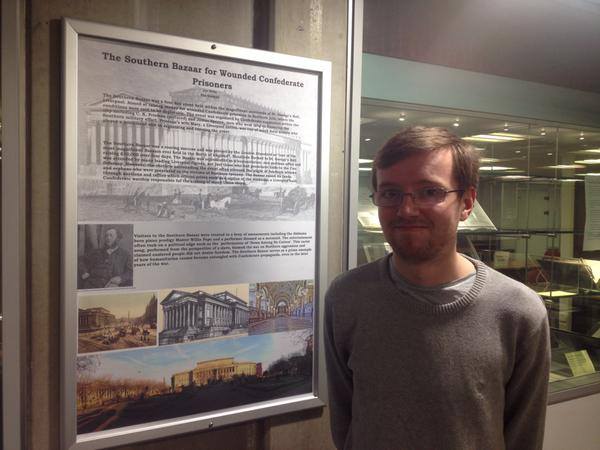
Joe Kelly, PhD researcher with the University of Liverpool and International Slavery Museum
You may have seen discussions in the news about fair trade and supply chains recently? And Fairtrade Fortnight 2016 is fast approaching...
On 1 March, we are bringing together experts to
discuss the Modern Slavery Act, and its ability to deal with British companies profiting from modern slavery in their supply chains.
This will be followed by a guided tour of our
‘Broken Lives: Slavery in Modern India’ exhibition.
Ahead of this, we're speaking to Joe Kelly, an ESRC funded PhD researcher with the
University of Liverpool and
International Slavery Museum. His work focuses on the relationship between British businesses in the post-emancipation period. Here's Joe's guest-blog....
"In the years following the abolition of slavery in the British Empire many British subjects remained interested in slavery and the slave trade in the wider world. My doctoral dissertation explores how this profiting from slavery was understood given Britain’s commitment to anti-slavery ideals throughout the 19th century.
"British links to slavery took a wide variety of forms; from importing slave-grown Brazilian sugar to the export of manufactured goods for use in the slave trade. Many of these connections can be found in the Middle Passage and Legacies gallery of the museum, which detail how the profits of slavery flowed into Britain, and particularly Liverpool.
"Britain’s commitment to suppressing the slave trade and opposing slavery raised difficult questions about the extensive business British subjects did with countries that still relied on unfree labour. A prime example of this was the contribution of Liverpool businesses to the Southern war effort during the American Civil War.
"The Confederate states were fighting to save the institution of slavery and Merseyside businesses played a vital role in aiding their cause. From shipbuilding to the purchase of cotton by merchants, Livepudlians played a vital role in the conflict. Alongside colleagues at the University of Liverpool I recently co-authored an online exhibition exploring the city’s contribution to the American Civil War. This project focused on Charles Prioleau, the head of the Confederate operation in Liverpool whose records are held by the maritime archives.
"Going forward in my research I will continue to work closely with the International Slavery Museum. This will include the panel on ‘Slavery and Supply Chains’ as part of Fairtrade Fortnight on 1 March."
More information on
Joe's research and online exhibition about Liverpool’s Abercromby Square and the Confederacy During the U.S. Civil War
.

 Joe Kelly, PhD researcher with the University of Liverpool and International Slavery Museum
You may have seen discussions in the news about fair trade and supply chains recently? And Fairtrade Fortnight 2016 is fast approaching...
On 1 March, we are bringing together experts to discuss the Modern Slavery Act, and its ability to deal with British companies profiting from modern slavery in their supply chains.
This will be followed by a guided tour of our ‘Broken Lives: Slavery in Modern India’ exhibition.
Ahead of this, we're speaking to Joe Kelly, an ESRC funded PhD researcher with the University of Liverpool and International Slavery Museum. His work focuses on the relationship between British businesses in the post-emancipation period. Here's Joe's guest-blog....
Joe Kelly, PhD researcher with the University of Liverpool and International Slavery Museum
You may have seen discussions in the news about fair trade and supply chains recently? And Fairtrade Fortnight 2016 is fast approaching...
On 1 March, we are bringing together experts to discuss the Modern Slavery Act, and its ability to deal with British companies profiting from modern slavery in their supply chains.
This will be followed by a guided tour of our ‘Broken Lives: Slavery in Modern India’ exhibition.
Ahead of this, we're speaking to Joe Kelly, an ESRC funded PhD researcher with the University of Liverpool and International Slavery Museum. His work focuses on the relationship between British businesses in the post-emancipation period. Here's Joe's guest-blog....
